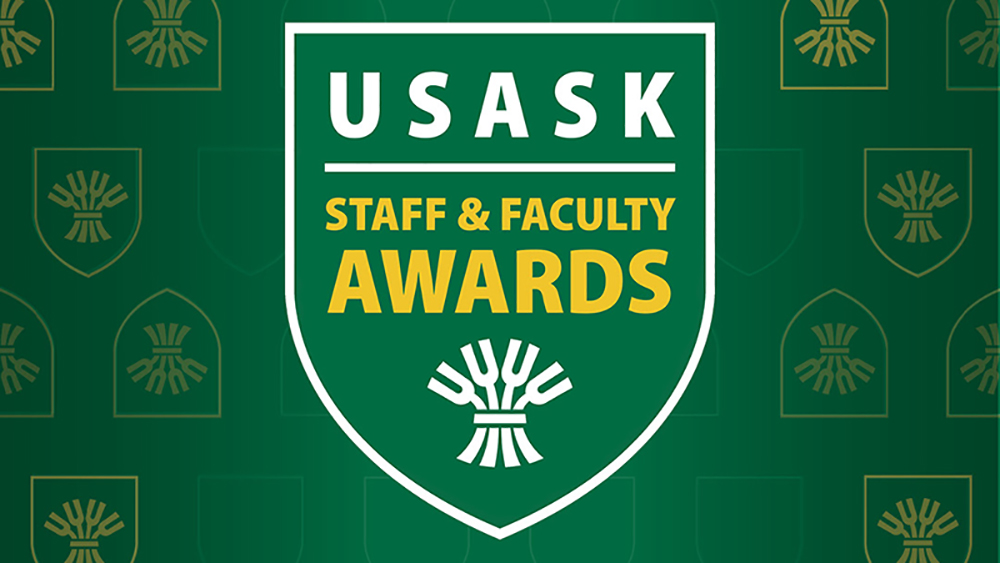
2022 University Staff Excellence Awards Winners
The University Staff Excellence Award recognizes staff members who have achieved excellence while demonstrating dedication and commitment to the university’s Mission, Vision and Values and support of the University Plan 2025. In 2022, the program again gave special recognition to those individuals who made exceptional contributions through the unexpected challenges of the pandemic, enabling the university to succeed through these extraordinary times.
2022 Recipients
- Deborah Briere, Manager, Clinical Learning Resources Centre, USask Health Sciences
- Katharine Fahlman-Smith, Director of Academic Recruitment and Immigration, Office of the Vice-Provost Faculty Relations
- Mary Freeman, Director, Clinical Learning Resources Centre, USask Health Sciences
- Adam Harrison, Manager, Controlled Environment Facility (Phytotron), College of Agriculture and Bioresources
- Danielle Larocque, Associate Director medSask/Continuing Professional Development of Pharmacy Professionals, College of Pharmacy and Nutrition
- Charles Lytle, Maintenance Planner, Facilities
- Mackenzie Malo, Laboratory Manager (Dadachova lab), College of Pharmacy and Nutrition
- Nancy Turner (PhD), Director, Teaching and Learning Enhancement
- Donna van de Velde, Program Assistant, University Library
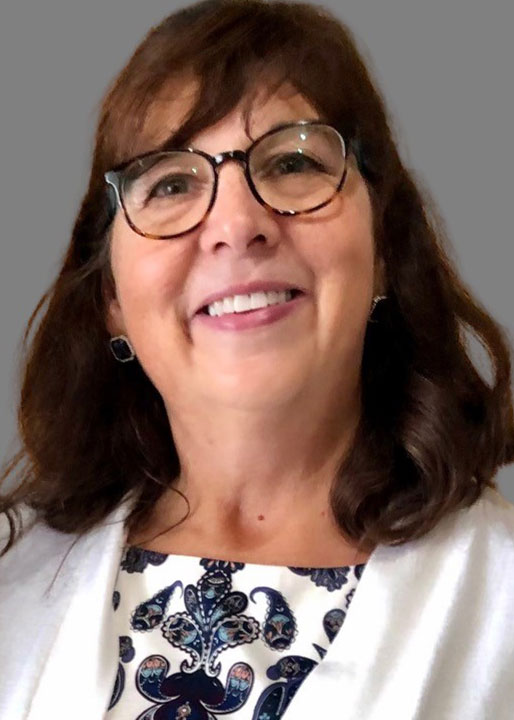
Deborah Briere
Manager, Clinical Learning Resources Centre
USask Health Sciences
Deborah Briere has been a manager and leader in the Clinical Resource Learning Centre (CLRC) in USask Health Sciences for over two decades and during this time has helped grow the centre into a learning facility that performs beyond the highest standards.
Through collaboration and strong relationships, she has continued to improve the educational services provided by the CLRC to better meet the needs of stakeholders in the community, around the province, and across the country. This includes working to increase recruitment of Indigenous standardized patients, so that students have opportunities to learn from Indigenous peoples to provide more culturally safe care, in support of reconciliation. She also incorporated 2SLGBTQA content into the program and went above and beyond to form relationships and partnerships to bring those voices into the curriculum.
Briere has truly embodied the university’s mission to “serve the public good by connecting discovery, teaching, and outreach, by promoting diversity and meaningful change, and by preparing students for enriching careers and fulfilling lives as engaged global citizens.”
At a time of profound disruption within the health care system, the work of the CLRC, with Briere as its manager, has been instrumental in supporting the pandemic health care response within Saskatchewan. This has included helping to ensure undergraduate health sciences students have continued their clinical education with as few disruptions as possible, particularly critical when access to learning opportunities in hospitals and clinics has been limited by high case numbers. The flexibility and creativity shown by Briere and her staff contributed to the ability of health sciences programs to continue to graduate their students to meet health human resource needs, all while ensuring the safety of students, staff, faculty, tutors, and simulated patients.
Briere does her work with enthusiasm and a positive attitude, which inspires the CLRC team to engage with everyone they work with in a respectful and supportive way. She is respected for her ability to turn any problem into a possibility and create unique learning experiences and opportunities for students. She has built a strong team whose goal is to do the best they can, every day, to support health sciences education.

Katharine Fahlman-Smith
Director of Academic Recruitment and Immigration
Office of the Vice-Provost Faculty Relations
Katharine Fahlman-Smith’s role on campus is truly one of a kind. She is entrusted with supporting colleges and schools with recruitment of faculty, a role that involves the significant international recruitment of faculty, administrative and staff talent from across Canada and around the world.
In her role, Fahlman-Smith provides exceptional service, ensuring that new hires have a great experience getting to Saskatoon. She has demonstrated time and time again that she is willing to step up to any challenge presented, providing expert advice on complicated immigration and human resources matters. With her in-depth knowledge of federal and provincial regulations and programs and her understanding of USask’s recruitment challenges, she finds creative ways to address the needs of a person while managing any risks to both the university and the college.
Despite ever-changing pandemic limitations on travel and immigration, Fahlman-Smith navigated the system to get new hires to Saskatoon and settled into new homes. Her guidance to these new employees, and their families, was crucial for USask to continue to recruit world-renowned talent during this difficult time. At many points along these journeys, people were stressed about whether they would be allowed to board planes, cleared for international departures, and ultimately whether they would be allowed to enter Canada. Their instructions were to call Fahlman-Smith if anything went awry, and she was on the other end of that call, at all hours, to navigate them through the processes.
Fahlman-Smith continually goes above and beyond, showing compassion for new hires and their situations. For example, she often would do walk-throughs of new homes using video chat to put people’s minds at ease with their new living arrangements, co-ordinate their belongings to arrive when they did so they could quarantine in their homes, and make sure people had food and drinks in their house when they arrived.
Fahlman-Smith’s service to the university is nothing short of exemplary. She is the face of USask for new hires and her caring and respect for the diversity of the faculty and their families displays how she lives USask’s values in her interactions with our new faculty and administrators.

Mary Freeman
Director, Clinical Learning Resources Centre
USask Health Sciences
In her role as director of the Clinical Learning Resources Centre (CLRC), Mary Freeman has made a significant difference for all health science students on campus studying medicine, dentistry, veterinary medicine, nursing, pharmacy, nutrition, and physiotherapy. This is especially true during the COVID- 19 pandemic when she has provided unwavering support and guidance, ensuring that everyone who accesses the CLRC could continue their work in as safe an environment as possible, while adhering to all public health protocols imposed by the university and the health region.
As many opportunities for students to gain hands-on experience were dissolved due to pandemic restrictions, Freeman collaborated with students, student union representatives, faculty, and university leaders to come up with a solution that was agreeable to all. Her collaboration with the college associate deans and the Pandemic Response Team (PRT) resulted in creating a healthy working and learning environment, as evidenced by that fact that CLRC has so far survived without an outbreak.
Freeman is a strong leader who excels at empowering her team to accomplish their goals. She is passionate about the work she does and is invested in ensuring that CLRC is successful, and her team is equipped with the right resources and tools to be able to effectively perform their duties well. She is not afraid to challenge existing processes and encourages others around her to think differently and identify creative solutions.
She has always viewed feedback as an opportunity to learn, grow and improve and is committed to make the CLRC the best centre in Canada. To do so, she has met with many directors from leading centres across Canada and the Unites States to discuss how they operate, find out what works well and what they struggle with, and benchmarks USask against these other centres. This project exemplifies how Freeman lives the University Plan 2025 in her work: courageous curiosity, boundless collaboration, and inspired communities. The relationships she has made, the ever-forward, out-of-the box thinking she employs, and the loyalty and commitment she has earned from her colleagues and staff drives meaningful change at the university.

Adam Harrison
Manager, Controlled Environment Facility (CES) Phytotron
College of Agriculture and Bioresources
Adam Harrison is a dedicated and committed individual who is motivated to ensure that his research facility remains a world leader that attracts the top students and researchers to the College of Agriculture and Bioresources. His dedication to keeping the phytotron operating at its peak efficiency has given the university a world-class facility to develop and further its disciplinary strengths.
Harrison’s colleagues describe him as a forward thinker who uses his experience to create a healthy learning and work atmosphere that models the university’s mission of being a welcoming place for collaborative and interdisciplinary knowledge sharing.
At the onset of the COVID-19 pandemic, the phytotron unexpectedly became significantly under-staffed. Harrison was left to maintain close to 200 environmentally controlled chambers on his own. This was in addition to continuously covering on-call duties for facility emergencies outside of regular working hours. Harrison took extra precautions in his personal life to avoid exposure to COVID-19 because he knew there was no one else to cover the facility. Harrison gave up his evenings, weekends, and holidays to help ensure that the millions of dollars of research that is going on in his facility could be completed without disruption.
One of the goals of the University Plan 2025 is to enrich disciplines and indicates that interdisciplinary possibilities arise from disciplinary strength. In particular, it states that the Global Institute for Food Security was built over decades of excellence in specific areas related to plant genetics, soil science, and collaboration between experts in their fields. The phytotron is a key to the excellence achieved in these specific areas, and Harrison’s dedication to keeping the facility operating at its peak efficiency has given the university a world-class facility to develop and further its disciplinary strengths.
It is clear to those who work with Harrison that loves what he does and takes pride in his work, knowing that his commitment makes a difference to the campus community and beyond.
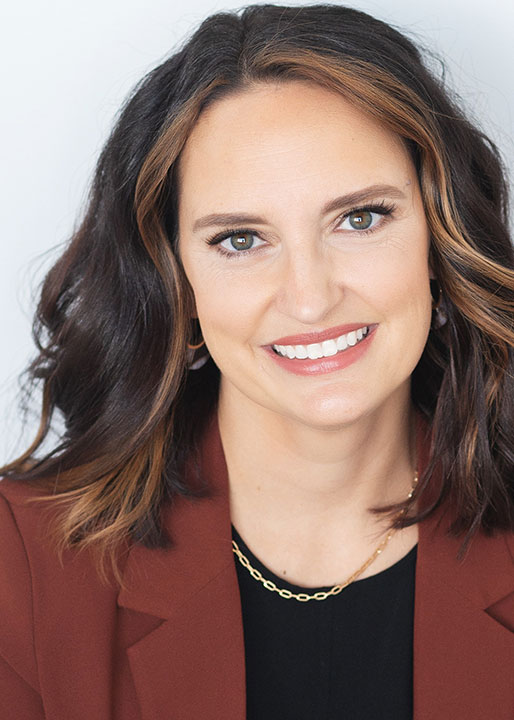
Danielle Larocque
Associate Director medSask/Continuing Professional Development of Pharmacy Professionals
College of Pharmacy and Nutrition
Danielle Larocque embodies the values of the university in her strengths with respect to collaboration, commitment to pharmacy practice, professional relationships with other health-care providers, and her natural leadership abilities to foster a highly functioning team of professionals.
In her role as associate director of medSask/Continuing Professional Development of Pharmacy Professionals in the College of Pharmacy and Nutrition, she works closely with the Saskatchewan Ministry of Health, Saskatchewan Health Authority (SHA), and the Saskatchewan College of Pharmacy Professionals (SCPP) on various matters related to the provincial COVID-19 response.
One example is after the Ministry of Health enabled emergency immunizers, which included pharmacy technicians and pharmacy students, Larocque and her team created an entire training and education program and expertly trained 245 additional immunizers in just six weeks to support the people of Saskatchewan. This addition made a significant difference in the ability to provide access and resources for COVID-19 immunizations. As the vaccines continued to roll out and change throughout the year, Larocque ensured her team was on top of providing excellent and timely information to members. Another example was within one week of the antiviral drug Paxlovid® being approved by Health Canada, medSask had education, resources, training and supports in place for health-care professionals. These efforts have been acknowledged widely by the health care community, and the resources are now utilized in other provinces.
In addition to the ever-changing pandemic work, Larocque continues to move forward on important initiatives for SCPP such as pharmacy manager training, researching, further harm reduction programing, creating a program for cultural sensitivity training and education with a Saskatchewan First Nations focus, and education on Equity, Diversity, and Inclusion. Larocque collaborates with colleagues within other health professions in Saskatchewan, with the SHA and Ministry of Health, and with pharmacy colleagues in British Columbia, Alberta, and Manitoba in order to deliver results on these important initiatives.
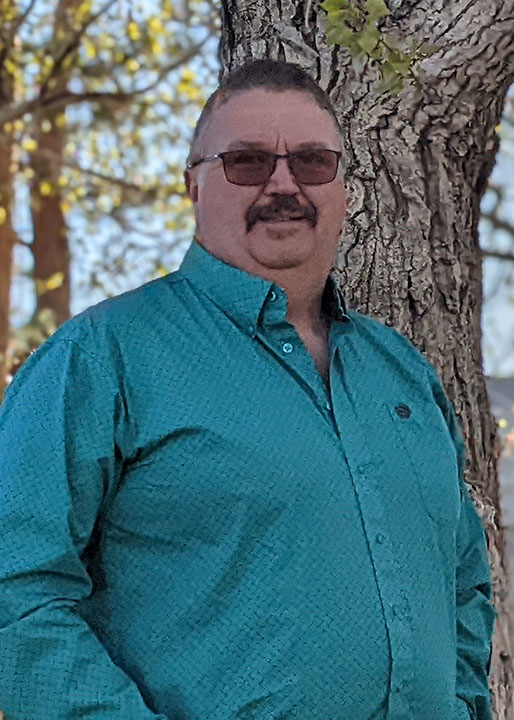
Charles Lytle
Maintenance Planner
Facilities
Throughout his career, and amplified during the pandemic, Chuck Lytle truly epitomizes the USask values and the overarching theme of boundless collaboration.
Lytle routinely demonstrates the values and principles of collaboration, innovation, collegiality, and excellence. He naturally goes above and beyond the expectations of his role and has developed strong relationships with colleagues and with individuals in the colleges and units that the facilities team supports. Despite only being in his current role for a little over a year (he has been on campus since 1997), he contributes by setting a high standard for his fellow maintenance planners, leading by example with his diligence, high quality of work, willingness to tackle difficult situations, and his ability to come up with innovative and effective solutions to maintenance and service challenges.
When the COVID-19 pandemic first impacted USask in March of 2020, Lytle was one of the individuals who remained on campus to maintain the buildings and infrastructure, while most of campus moved remotely. Throughout this time, he was continually engaged, bringing forward innovative ideas on how the university could continue to operate safely while at the same time maintaining the campus infrastructure. As the course of the pandemic response began to shift back to on-campus, Lytle volunteered to take on a role as the subject matter expert, to help build out a robust preventive maintenance plan for our water and sewer infrastructure.
Since June of 2021, Lytle has been closely involved with the COVID-19 wastewater testing taking place on campus. Working with Dr. Markus Brinkmann (PhD), Dr. Kerry McPhedran (PhD), and their research colleagues, he came up with innovative ways to deploy and collect sampling devices from wastewater streams within manholes at various locations on campus. Boundless collaboration with the research team and simple but innovative solutions invented by Lytle allowed this important work to be done on campus.
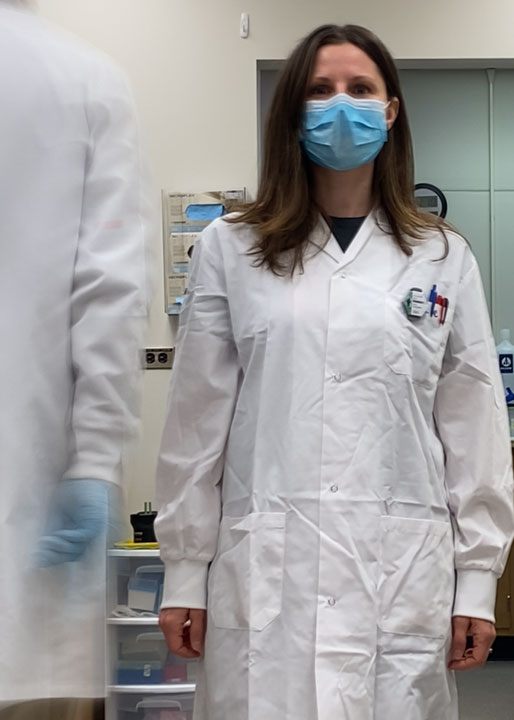
Mackenzie Malo
Laboratory Manager (Dadachova lab)
College of Pharmacy and Nutrition
Through her daily contributions to the Dr. Ekaterina Dadachova (PhD) laboratory in the College of Pharmacy and Nutrition, Mackenzie Malo has helped boost USask’s reputation as being a world-class research university and a world leader in radio-pharmacy.
The laboratory of Dr. Dadachova is involved in cutting-edge world-class research into new uses of radioactive compounds for the treatment of human diseases including HIV, drug resistant infections, autoimmune diseases, and cancer, and to compounds that can protect humans from exotic types of radiation. Malo navigates the procurement of a wide variety of radioactive chemicals, many of which are imported from other countries through regulatory agencies. This allows researchers and students to conduct research without the burdens of navigating regulatory systems. Without her perseverance and competence, this research would be nearly impossible.
The productivity of Dr. Dadachova’s lab has led to international collaborations with researchers from the United States, Japan, the Netherlands, Brazil, and others as well as industrial partnerships and contract research with several pharmaceutical companies. She is also involved with the training of all the students who work in Dr. Dadachova’s lab, guiding them through their research and the successful completion of graduate degrees.
On top of this, Malo continues to conduct her own research and helps mentor the students in the lab. She has published and co-authored numerous publications and attends national and international conferences to share her discoveries. It was because of her perseverance and dedication that she was able to continue to conduct her own research for the Canadian Space Agency during the pandemic to evaluate a special diet for astronauts to protect them from cancer-causing radiation present in space. After a two-year regulatory process was in jeopardy in early 2020 when the pandemic shut down most of the world, Melo navigated the new and changing regulations and restrictions to be able to travel to the United States with her colleague, working day and night to complete the experiment before their funding expired.
Melo was also able to co-ordinate a full lab start-up as soon as possible in July 2020 despite the very complex nature of the work performed that spans different university buildings and facilities and requires strict supply chain co-ordination. Due to her efforts, Dr. Dadachova’s laboratory was able to keep up productivity and had a very minimal effect on the graduate students, allowing for on-time completion of their program.

Dr. Nancy Turner (PhD)
Director
Teaching and Learning Enhancement
Leading a highly agile and remarkably successful response to pandemic teaching, Dr. Nancy Turner (PhD) created trusting relationships across campus that allowed a very distributed system of teaching to work collectively, genuinely changing how students can learn at USask.
Turner, the director of teaching and learning enhancement, cares deeply about student learning and goes far beyond her job description to ensure they have strong learning experiences. Colleagues consider her to be one of the strongest “big idea” people leaders that not only comes up with creative and innovative ideas but also has what it takes to make sure projects advance from ideas to implementation. Everything she does is done through a model of collaboration and an honouring of the fact that there are different ways of knowing, learning, and being.
During the pandemic, Turner provided guidance and supports to faculty colleagues who were called upon to switch to remote delivery and quickly develop the requisite skills to maintain a high standard of student experience. She is responsible for listening to the needs of faculty and students and developing the pillars that would support the preservation and enhancement of learning outcomes during a period of constant change. Turner co-ordinated several student surveys and focus groups, sharing the data widely to influence practice. She ensures student experience continues to be shaped by the students’ own feedback and by unique opportunities to collaborate with their peers. She focused attention on ways to retain collaboration and community during the pandemic, ensuring virtual environments across our campus were connected, collaborative and welcoming.
Turner is also helping define and shape a new way of learning at USask. She has initiated the development of the Learning Technology Ecosystem and is helping redesign classroom spaces as flexible and supportive of collaborative connections. Nearly half of all students now choose to access the learning management system (LMS) Canvas, via a mobile device, something that was impossible two years ago in Blackboard, and this change happened specifically due to her work steering the procurement of the new LMS.
Turner consistently works on projects beyond the expectations of her role, creating a work environment that is innovative, accessible, and welcoming. Faculty and staff stand up to work alongside her because of her dedication, boundless energy, and optimistic approach that she brings to her work.
As USask continues to strive to be the university the world needs through our University Plan 2025, Turner will be relied upon to help find new ways to achieve exceptional teaching and engagement – meeting USask’s aspiration to set the standard in this area.
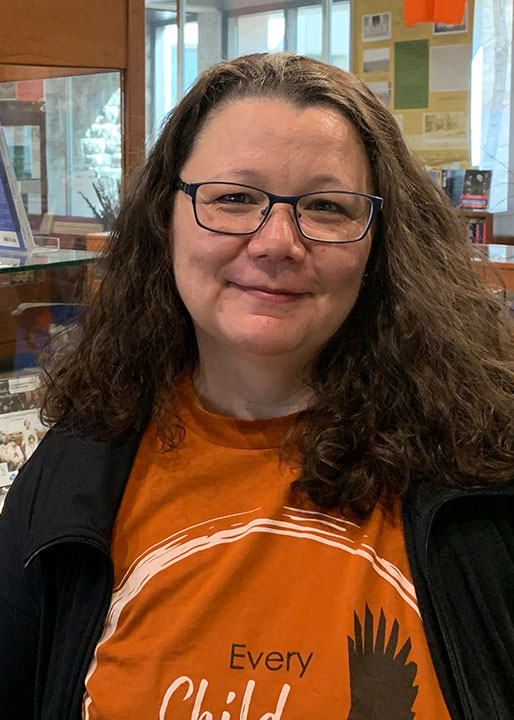
Donna van de Velde
Program Assistant
University Library
In her role assisting with student learning programming, Donna van de Velde has been instrumental in helping the University Library adapt and rethink old ways of doing things, helping overcome the initial hurdle of going remote so that the library could do what it needed to do – support students.
When campus went remote in March 2020, van de Velde quickly immersed herself in what it would take to function as an online institution. She established procedures and developed help resources so that librarians, learning specialists, and peer mentors could continue facilitating timely workshops and programming virtually to support the needs of undergraduate and graduate students. She quickly become the resident expert in platforms such as WebEx and Zoom. She also initiated the recording, posting and subtitling of these new online workshops so students can now watch workshop recordings at their own pace and at their own time, a significant shift in what the University Library and the wider campus was doing prior to the pandemic.
Her commitment to the university took additional shape in the fall 2021 term when she co-curated the exhibit, Not Just Another Day Off, which commemorates the legacy of the residential school system. This exhibit reflected her desire to ensure that the first National Day of Truth and Reconciliation does not turn into a simple holiday. Instead, she wants to help preserve the significance of the day as one meant for reflection and truth to enable reconciliation in Canada. This physical and online exhibit is already being used by faculty to support their teaching.
Through such projects and relationship building, van de Velde helps connect the University Library to the larger campus and keeps questions of decolonization and support for Indigenous students, scholars, and staff at the forefront, in line with the university’s aspiration of transformative decolonization leading to reconciliation.
van de Velde is also a considerate colleague and friend, acting as the unofficial birthday card maker in her group, ensuring that everyone’s special day is recognized and celebrated. It may be a small act, but it contributes to a sense of belonging and community, which has been especially important during the pandemic.
In summary, van de Velde is an asset not just to the University Library, but to the entire campus. Not only has she responded effectively to the challenges of the pandemic, enabling her coworkers to fulfil many of their core responsibilities following the transition to online delivery, but she continues to be responsive to our student population. More than that, she regularly takes the initiative to ensure that our campus continues to learn from the past and the present, even as it remains focused on the future.
